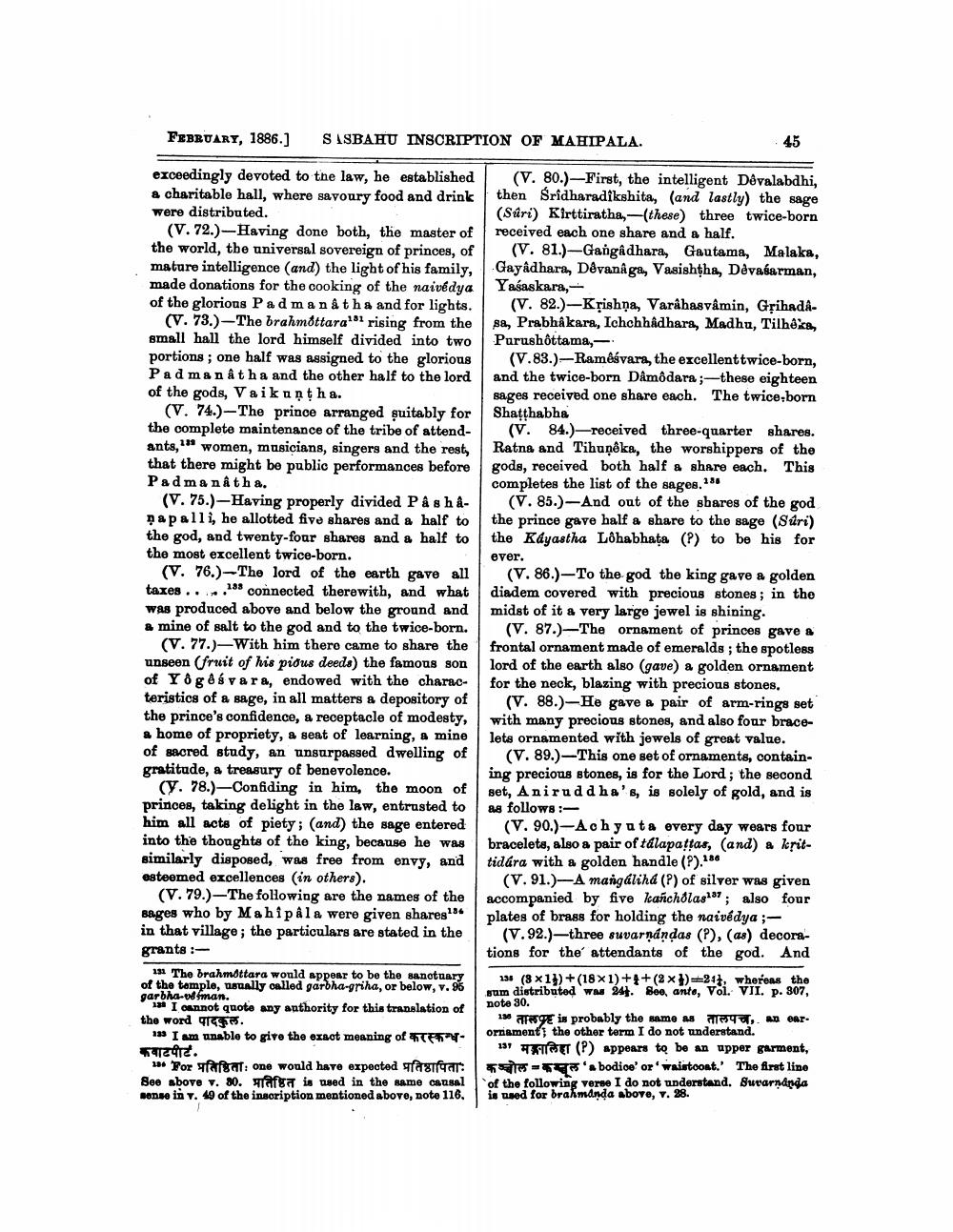________________
FEBRUARY, 1886.]
SASBAHU INSCRIPTION OF MAHIPALA.
45
exceedingly devoted to the law, he established (V. 80.)-First, the intelligent Dévalabdhi, a charitable hall, where savoury food and drink then Sridharadikshita, (and lastly) the sage were distributed.
(Sari) Kirttiratha, -(these) three twice-born (V. 72.)-Having done both, the master of received each one share and a half. the world, the universal sovereign of princes, of (V. 81.)- Gangadhara, Gautama, Malaka, mature intelligence (and) the light of his family, Gayâdhara, Devanaga, Vasishtha, Dévasarman, made donations for the cooking of the naivedya
Yasaskara, - of the glorious Padmanatha and for lights. (V. 82.)-Krishna, Varahasvâmin, Grihada
(V. 73.)-The brahmottara11 rising from the sa, Prabhakara, Ichchhâdhara, Madhu, Tilheks, small hall the lord himself divided into two | Purushottama,portions ; one half was assigned to the glorious (V.83.)-Ramêsvars, the excellenttwice-born, Padman â tha and the other half to the lord and the twice-born DÂmôdara;-these eighteen of the gods, Vaikuntha.
sages received one share each. The twice born (V. 74.)-The prince arranged suitably for the complete maintenance of the tribe of attend- (v. 84.)—received three-quarter shares. ants, ** women, musicians, singers and the rest, Ratna and Tihuņêka, the worshippers of the that there might be public performances before gods, received both half a share each. This Padma natha.
completes the list of the sages. 136 (V. 75.)-Having properly divided Pås hå- (V. 85.)-And out of the shares of the god papalli, he allotted five shares and a half to the prince gave half a share to the sage (Súri) the god, and twenty-four shares and a half to the Kdyastha Lôhabhata (?) to be his for the most excellent twice-born.
ever. (V. 76.)-The lord of the earth gave all
(V. 86.)-To the god the king gave a golden taxes ...... 18 connected therewith, and what diadem covered with precious stones; in the was produced above and below the ground and midst of it a very large jewel is shining. & mine of salt to the god and to the twice-born. (V. 87.)-The ornament of princes gave &
(V. 77.)—With him there came to share the frontal ornament made of emeralds ; the spotless unseen (fruit of his pious deeds) the famous son lord of the earth also gave) a golden ornament of Yoga á vara, endowed with the charac- for the neck, blazing with precious stones. teristics of a sage, in all matters & depository of (V. 88.)- He gave a pair of arm-rings set the prince's confidence, a receptacle of modesty, with many precious stones, and also four bracea home of propriety, a seat of learning, a mine lets ornamented with jewels of great value. of sacred study, an unsurpassed dwelling of (V. 89.)-This one set of ornaments, containgratitude, a treasury of benevolence.
ing precious stones, is for the Lord; the second (y. 78.)-Confiding in him, the moon of set, Aniruddha's, is solely of gold, and is princes, taking delight in the law, entrusted to as follows: him all acts of piety; (and) the sage entered (V. 90.)- Achyuta every day wears four into the thoughts of the king, because he was bracelets, also a pair of tdlapatas, (and) a kritsimilarly disposed, was free from envy, and tidara with a golden handle (?).186 esteemed excellences in others).
(V. 91.)- A mangaliha (P) of silver was given (V. 79.)-The following are the names of the accompanied by five kañcholas187; also four Bages who by Mahipala were given shares" plates of brass for holding the naivedya :in that village; the particulars are stated in the (V.92.)-three suvarnandas (P), (as) decoragrants :
tions for the attendants of the god. And in The brahmottara wonld appear to be the sanctuary 236 (8x1})+(18X1)+4+ (2x)=21}, whereas the of the temple, usually called garbha-griha, or below, v. 96
sum distributed was 341. seo, ante, Vol. VII. P. 307, garbha- man. * I annot quote any anthority for this translation of
note 30. theword पादकुल.
13 alese is probably the same as 4 . Ad ear133 I am unable to give the exact meaning of PT
ornament, the other term I do not understand. 1912 .
13 W et (P) appears to be an upper garment, 13. For wagat: one would have expected fartfear: | - e'bodioe' or' waistoont.' The first line See above v. 80. Hafra is used in the same causal of the following verne I do not understand. Swarnanda sense in v. 19 of the inscription mentioned above, note 116, is used for brahmanda above, v. 28.




